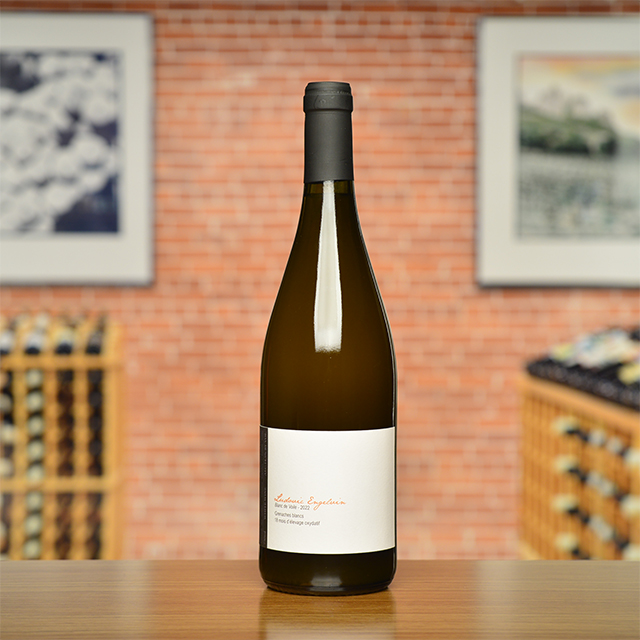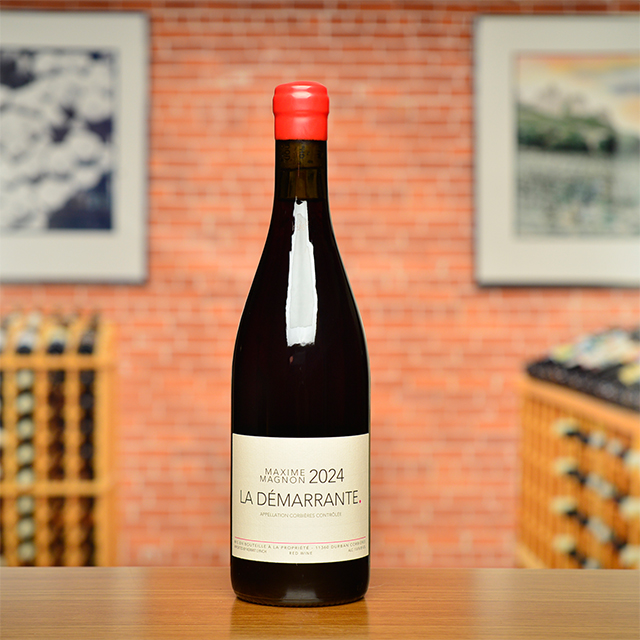Notify me
2017 Pays de l’Aude Blanc “Le Pied des Nymphettes”
Domaine Les Mille Vignes
This is a dry white. The nose soars from the glass—wildflowers from the Mediterranean basin, if you ask me—with incredible finesse. A nymphette with class? On the palate: round, shapely, a slight bitterness like bay leaf, a salinity from the nearby sea, and great freshness. The flavors penetrate—unusual in white wines. Penetrate with finesse. Not a bad bumper sticker.
—Kermit Lynch
| Wine Type: | white |
| Vintage: | 2017 |
| Bottle Size: | 750mL |
| Blend: | 70% Carignan Blanc, 20% Grenache Blanc, 2% Vermentino, 2% Malvoisie, 2% Clairette, 2% Colombard, 2% Macabeu |
| Country: | France |
| Region: | Languedoc-Roussillon |
| Producer: | Domaine Les Mille Vignes |
| Vineyard: | 30-40 years old |
| Soil: | Clay, Limestone |
| Farming: | Organic (practicing) |
| Alcohol: | 14% |
More from this Producer or Region

2018 Vin de France “Grenache Oxydatif”
France | Languedoc-Roussillon
At once similarly saline and nutty as vin jaune or sherry, but also singular and standalone in its notes of watermelon flesh and rind.

2020 Faugères “Jadis”
France | Languedoc-Roussillon
Earthy, meaty, savory, juicy, and powerful, it is a glassful of joyful, soulful goodness.

2022 Vin de France Blanc de Voile
France | Languedoc-Roussillon
If you’re a fan of Jura’s vin jaune or fino and manzanilla sherry, find yourself a new friend in this rare bottling from Ludovic Engelvin.

2019 Faugères “Valinière”
France | Languedoc-Roussillon
Valinière is a monumental demonstration of what happens when respectfully working the earth is not just a job, but one’s whole life.

2022 Vin de France Blanc
France | Languedoc-Roussillon
Searching for something a bit funky to enliven your jaded palate? Look no further and prepare for an experience like none other.

2023 Vin de France “Le Carignan”
France | Languedoc-Roussillon
Old vines give this Carignan a supple, suede-like texture, along with loads of dark fruit, a peaty smokiness, and great minerality.

Banyuls Vinegar
France | Languedoc-Roussillon
This vinegar is particular because it’s made with sweet wine, which confers a very unique taste.

2022 Pic Saint Loup Rouge
France | Languedoc-Roussillon
There is something timeless to La Roque’s Pic Saint Loup, its herbal bouquet and rich, fleshy texture, all free from any hint of modern trappings.

2024 Corbières Rouge “La Démarrante”
France | Languedoc-Roussillon
This is what happens when the Languedoc meets the Beaujolais: old Carignan and Cinsault fermented by carbonic maceration to make something light, fresh, and delicious.

Cap de Creus “Ranci Sec”
France | Languedoc-Roussillon
Evaporation over time has concentrated the wine, giving it considerable strength to go with its trademark rancio aromas of walnuts and brine.
 /
/
About The Producer
Domaine Les Mille Vignes
About The Region
Languedoc-Roussillon

Ask wine drinkers around the world, and the word “Languedoc” is sure to elicit mixed reactions. On the one hand, the region is still strongly tied to its past as a producer of cheap, insipid bulk wine in the eyes of many consumers. On the other hand, it is the source of countless great values providing affordable everyday pleasure, with an increasing number of higher-end wines capable of rivaling the best from other parts of France.
While there’s no denying the Languedoc’s checkered history, the last two decades have seen a noticeable shift to fine wine, with an emphasis on terroir. Ambitious growers have sought out vineyard sites with poor, well draining soils in hilly zones, curbed back on irrigation and the use of synthetic fertilizers and pesticides, and looked to balance traditional production methods with technological advancements to craft wines with elegance, balance, and a clear sense of place. Today, the overall quality and variety of wines being made in the Languedoc is as high as ever.
Shaped like a crescent hugging the Mediterranean coast, the region boasts an enormous variety of soil types and microclimates depending on elevation, exposition, and relative distance from the coastline and the cooler foothills farther inland. While the warm Mediterranean climate is conducive to the production of reds, there are world-class whites and rosés to be found as well, along with stunning dessert wines revered by connoisseurs for centuries.
More from Languedoc-Roussillon or France
2021 Corbières Rouge “Campagnès”
Maxime Magnon France | Languedoc-Roussillon
2022 Pic Saint-Loup Rouge
Château Fontanès France | Languedoc-Roussillon
2020 Pic Saint Loup Rouge “Cupa Numismae”
Château La Roque France | Languedoc-Roussillon
Banyuls “Reserva”
Domaine La Tour Vieille France | Languedoc-Roussillon
Cap de Creus “Ranci Sec”
Domaine La Tour Vieille France | Languedoc-Roussillon
2024 Vin de France Rouge “Saint Jacques”
Maxime Magnon France | Languedoc-Roussillon
Banyuls Vinegar
Domaine La Tour Vieille France | Languedoc-Roussillon
2022 Vin de France Blanc
Domaine Leon Barral France | Languedoc-Roussillon
2022 Languedoc Montpeyroux Rouge
Domaine d’Aupilhac France | Languedoc-Roussillon
2022 Vin de France Blanc “Malvoise”
Château La Roque France | Languedoc-Roussillon
2022 Corbières Rouge
Domaine de Fontsainte France | Languedoc-Roussillon
2022 Pic Saint Loup Rouge
Château La Roque France | Languedoc-Roussillon
2021 Corbières Rouge “Campagnès”
Maxime Magnon France | Languedoc-Roussillon
2022 Pic Saint-Loup Rouge
Château Fontanès France | Languedoc-Roussillon
2020 Pic Saint Loup Rouge “Cupa Numismae”
Château La Roque France | Languedoc-Roussillon
Banyuls “Reserva”
Domaine La Tour Vieille France | Languedoc-Roussillon
Cap de Creus “Ranci Sec”
Domaine La Tour Vieille France | Languedoc-Roussillon
2024 Vin de France Rouge “Saint Jacques”
Maxime Magnon France | Languedoc-Roussillon
Banyuls Vinegar
Domaine La Tour Vieille France | Languedoc-Roussillon
2022 Vin de France Blanc
Domaine Leon Barral France | Languedoc-Roussillon
2022 Languedoc Montpeyroux Rouge
Domaine d’Aupilhac France | Languedoc-Roussillon
2022 Vin de France Blanc “Malvoise”
Château La Roque France | Languedoc-Roussillon
2022 Corbières Rouge
Domaine de Fontsainte France | Languedoc-Roussillon
2022 Pic Saint Loup Rouge
Château La Roque France | Languedoc-Roussillon
Kermit once said...

Kermit once said...
You don’t have to be rich to cellar a great wine.














